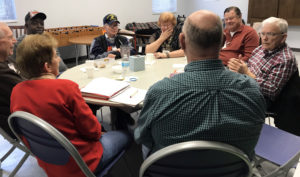Grant Helps Fund ‘Brain Wave’ Program at St. John’s Community Care

Participants in the Brain Wave program can share stories and benefit from peer support.
The UCC’s St. John’s Community Care in Collinsville, Ill., saw an underserved population in its community, but needed funding for programming. Thanks to a grant from The Retirement Research Foundation, the adult day and home services agency started Brain Wave, a program that serves older adults with early memory loss.
“We have provided care for individuals with significant memory loss and dementia in our Adult Day Center since 2001, and have added support and training for their care partners. We recognized that there is virtually no support in our community for individuals who have been diagnosed with early stage memory loss or dementia who do not yet require constant supervision,” says Nancy J. Berry, executive director. “Knowing how devastating it is to receive such a diagnosis and to be living with the expectation that the condition will progress, we decided it was important to find a way to support these individuals. Brain Wave is now addressing that need.”
The grant of $30,619 enabled St. John’s Community Care to begin the new program last October. The Brain Wave program focuses specifically on people with the earliest stages of memory loss. It is part of a more proactive stance on memory issues encouraged by the Alzheimer’s Association, and focuses on stabilizing participants’ cognitive skills, increasing their coping skills, and reducing depression and social anxiety.
“We were delighted to receive a grant to help us develop this new program, as it required designing the curriculum, recruiting and training facilitators, and marketing to reach the individuals who will benefit,” says Berry. “Now that Brain Wave is up and running, we expect fees charged to those who can afford them will cover our additional staffing costs. We also are developing scholarship opportunities for individuals who need them.”
Brain Wave’s small group setting provides a safe, positive, strength-based environment where participants work with an expert. Specific goals are identified for each person. During the weekly sessions, members find peer support from their classmates while engaging in meaningful and mentally-challenging activities that build upon their strengths and abilities.
“My husband attended the first session last fall and thoroughly enjoyed it,” says Ruth, the spouse of a participant who still attends the classes. “He looked forward to each day … [and] probably would have stayed longer than the four hours of the session. He has always been a social person and really enjoyed having interaction with others. He seems to be happier and not depressed.”
Berry says that reaction is exactly why St. John’s wanted to start the program. “Those who have participated so far have benefited by expressing their fears and anxieties, sharing laughter with their peers, and feeling empowered by the activities,” she says. “In addition, their care partners have benefited from some education on dementia and individual consultations to address their concerns and need to plan for the future.”
Early Memory Loss (EML) is used to refer to the set of cognitive conditions that may affect people who could benefit from EML programs. Two of the most common conditions that produce early memory loss are Mild Cognitive Impairment and early-stage dementia. Most persons with MCI function well in familiar everyday activities and are usually aware of, and often worried about, their cognitive changes.
“People living with memory loss are uniquely impacted by participating in early memory loss programs. We are extremely happy to be able to offer this valuable program,” says Linda Robertson, a Brain Wave program facilitator. “It’s really an optimistic and assertive way to approach and aid people with early memory loss. Programs like this are a beacon of hope for those struggling to understand and cope with their situation.”
CHHSM member St. John’s Community Care was established by St. John United Church of Christ in 1985 to provide non-medical home services. It added the Adult Day Program in 2001 after St. John UCC built a facility for the program. In early 2013, St. John’s Community Care opened a second building in Edwardsville, and now serves nine communities.
The Retirement Research Foundation is one of the first private foundations devoted exclusively to the issues older adults face. Its grantmaking programs support innovative advocacy, direct service, professional education and training, and research projects that benefit older Americans.
Join Our Mailing LIst
Follow on Facebook
Iredell Adult Day Services Hosts Ribbon-Cutting to Celebrate Adult Day Health Certification - CHHSM
www.chhsm.org
Iredell Adult Day Services (IADS) in Newton, N.C. — a nonprofit organization dedicated to caring for older adults, vulnerable groups, and their families, and part of EveryAge — hosted a ribbon cut...